Understanding the Role of Insulin Resistance in PCOS: A Comprehensive Guide
Struggling with stubborn weight, irregular periods, or unexplained acne? What if the root cause wasn’t just your hormones, but a hidden issue affecting millions of women with PCOS? Discover how insulin resistance in PCOS could be the missing link in managing your symptoms and reclaiming your health.
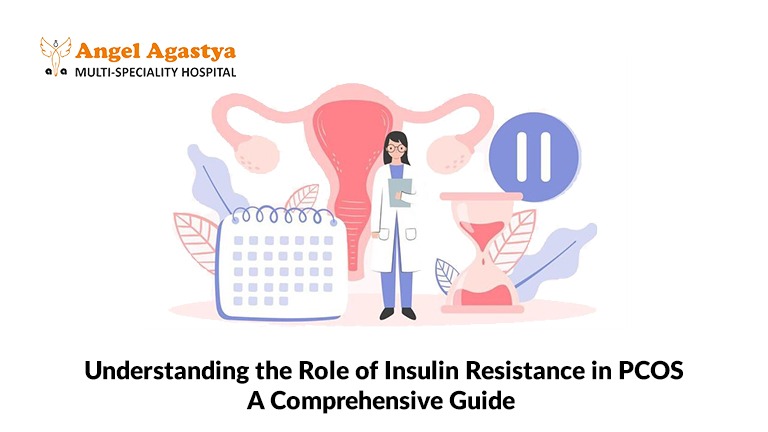
Introduction
Polycystic Ovary Syndrome (PCOS) is one of the most common hormonal disorders affecting women worldwide, with significant health implications. However, what many don’t realize is the critical role insulin resistance in PCOS plays in the development and progression of PCOS. Without managing insulin resistance in PCOS effectively, PCOS symptoms can worsen, making it harder to live a healthy, fulfilling life. In this comprehensive guide, we will break down what insulin resistance in PCOS is, how it ties into PCOS, and strategies you can adopt to better manage both conditions. If you’re dealing with PCOS or suspect you might be, understanding this connection could be the key to unlocking a healthier you.
Insulin Resistance and PCOS: A Closer Look
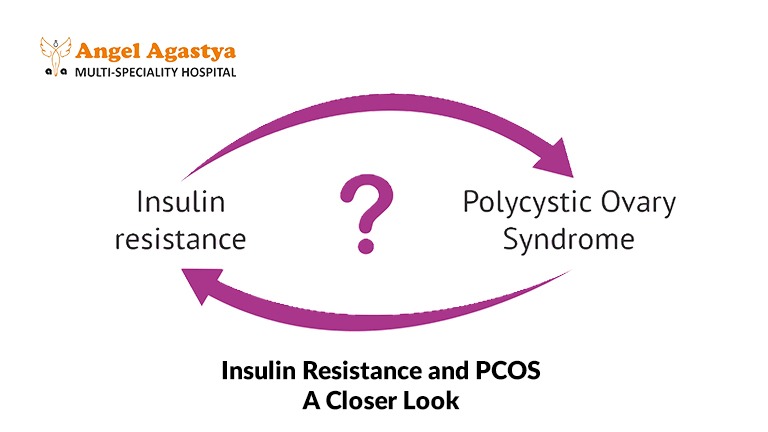
What is Insulin Resistance?
Insulin is a hormone that regulates blood sugar levels and helps your body use glucose (sugar) for energy. When you eat, your blood sugar rises, and insulin is released to help your cells absorb glucose. However, in insulin resistance in PCOS, your cells become less responsive to insulin, which means your body has to produce more insulin to compensate. This can lead to elevated blood sugar levels and, over time, can trigger serious health conditions like type 2 diabetes.
The Link Between Insulin Resistance and PCOS
The connection between insulin resistance in PCOS is undeniable. Research shows that insulin resistance in PCOS is present in about 70-80% of women with PCOS. Excess insulin in the bloodstream causes the ovaries to produce more androgens (male hormones), which contributes to the common PCOS symptoms, such as irregular periods, acne, and excess body hair. In other words, insulin resistance in PCOS exacerbates the hormonal imbalance already present in women with PCOS, making it more difficult to manage.
Why Does Insulin Resistance Happen in PCOS?
The exact cause is unclear, but genetics, obesity, and lifestyle factors can contribute to insulin resistance in PCOS. PCOS itself can lead to insulin resistance, and vice versa. This vicious cycle often complicates treatment, but recognizing the dual role of insulin resistance in PCOS can be the first step toward effective management.
The Impact of Insulin Resistance on PCOS
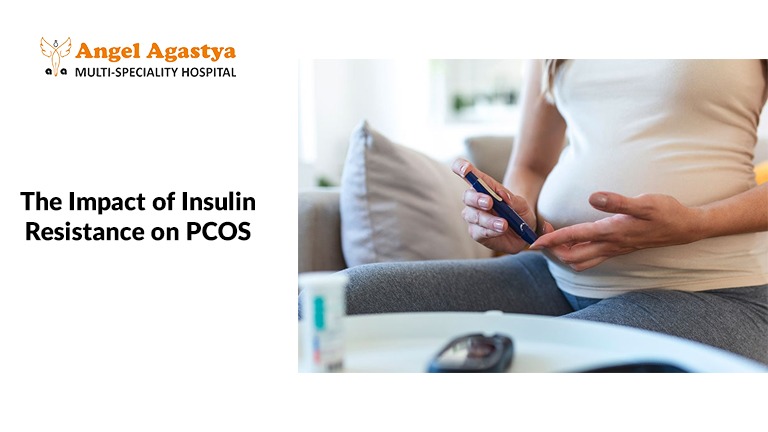
Hormonal Imbalances and Their Effects
When your body becomes resistant to insulin, it produces more of it to maintain normal blood sugar levels. However, this increased insulin also stimulates the ovaries to produce more testosterone, leading to classic PCOS symptoms like:
Irregular periods or missed periods, as high testosterone levels disrupt normal ovulation.
Excessive hair growth (hirsutism) on the face, chest, and back due to elevated androgen levels.
Acne and oily skin, are often worsened by high testosterone levels.
Gaining weight, particularly in the midsection, and finding it hard to lose it.
This hormonal imbalance not only affects your physical appearance but can also lead to emotional and psychological challenges, such as anxiety and depression.
Infertility and Reproductive Challenges
Insulin resistance can make it difficult for women with PCOS to conceive. Ovulation is often irregular or absent, making it harder to predict fertile windows. Even when ovulation occurs, insulin resistance can interfere with egg quality, reducing the chances of successful conception. Women struggling with infertility often feel immense emotional strain, making PCOS a condition that impacts far more than just physical health.
Increased Risk of Metabolic Health Complications
Beyond reproductive issues, insulin resistance puts women with PCOS at a much higher risk for other serious health problems:
Type 2 diabetes: Prolonged insulin resistance often leads to the development of type 2 diabetes, which can be life-threatening if not managed correctly.
Cardiovascular disease: Insulin resistance can lead to high blood pressure, unhealthy cholesterol levels, and an increased risk of heart attacks and strokes.
Sleep apnea: The link between insulin resistance, obesity, and sleep disorders is strong in women with PCOS, further complicating overall health management.
Managing Insulin Resistance and PCOS
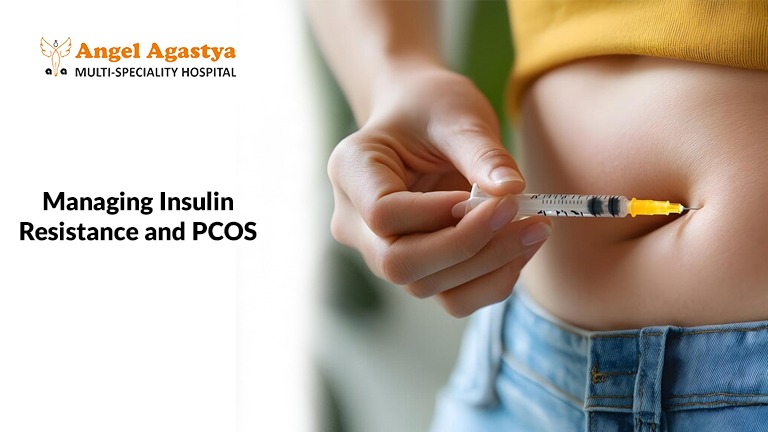
Lifestyle Modifications to Improve Insulin Sensitivity
A combination of lifestyle changes can significantly improve insulin sensitivity and help manage PCOS symptoms. These include:
- Healthy Diet: Focusing on a diet rich in whole foods, including fruits, vegetables, whole grains, lean proteins, and healthy fats, can stabilize blood sugar levels. The glycemic index (GI) diet, which emphasizes low-GI foods that do not spike blood sugar, is particularly beneficial for women with insulin resistance.
- Regular Physical Activity: Engaging in consistent, moderate exercise improves insulin sensitivity and promotes weight loss. Activities such as walking, swimming, or yoga can all help improve your overall health without putting too much stress on your body.
- Weight Management: Even a small reduction in body weight around 5-10% can significantly improve insulin resistance and PCOS symptoms. This is particularly important because excess weight can contribute to insulin resistance and hormonal imbalances.
Medications for Managing Insulin Resistance
Sometimes, lifestyle changes alone aren’t enough, and medications may be required:
- Metformin: Originally developed for type 2 diabetes, metformin is now commonly prescribed for women with PCOS to help improve insulin sensitivity and regulate menstrual cycles. It lowers blood sugar levels by improving the body’s response to insulin, making it a popular choice for women dealing with both PCOS and insulin resistance.
- Inositol supplements: Some studies suggest that supplements like inositol can help improve insulin sensitivity in women with PCOS, although more research is needed.
Hormonal Therapies for Symptom Management
In some cases, hormonal therapies may be necessary to manage PCOS symptoms:
Birth control pills: These help regulate menstrual cycles, reduce androgens, and address issues like acne and hirsutism. They also prevent endometrial hyperplasia, a condition where the lining of the uterus thickens, which can occur when ovulation is irregular.
Seeking Professional Help
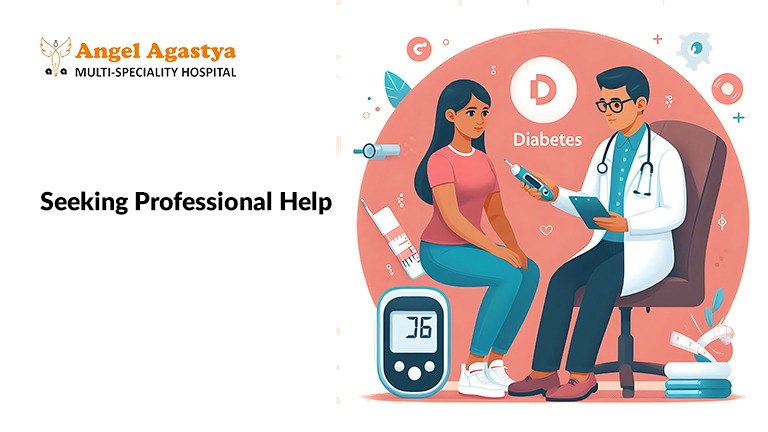
When to See a Doctor
If you suspect you may have insulin resistance or PCOS, it’s important to consult with a healthcare provider. Diagnosis usually involves blood tests to measure insulin and glucose levels, as well as hormone levels, and possibly an ultrasound to check for ovarian cysts.
Consulting with a Specialist
For more complex cases, seeking out a specialist in gynecology or endocrinology is essential. Endocrinologists are particularly experienced in managing hormonal imbalances and metabolic issues like insulin resistance, while gynecologists can focus on reproductive health.
Finding Support
Living with PCOS can feel overwhelming, which is why connecting with others who share your experience is beneficial. Support groups, either online or in person, can provide emotional support and practical advice from those who have gone through similar experiences. Communities for women with PCOS can also provide tips on diet, exercise, and treatment options.
Conclusion
Understanding the role of insulin resistance in PCOS is crucial for taking control of your health and managing this complex condition. By adopting a holistic approach that includes lifestyle changes, medication, and professional medical support, you can effectively reduce insulin resistance and mitigate the effects of PCOS. The journey toward better health with PCOS requires patience and consistency, but the positive changes in your body and overall well-being will be worth it. Remember, you’re not alone—there are many resources, professionals, and support groups available to help you manage your symptoms and improve your quality of life.
FAQs
What are the early signs of insulin resistance?
Some early signs include increased hunger, frequent urination, and unexplained weight gain, particularly around the abdomen.
Can insulin resistance be reversed?
Yes, through lifestyle changes like a healthy diet, regular exercise, and weight management, it is possible to improve insulin sensitivity.
What foods should I avoid if I have insulin resistance and PCOS?
Avoid processed foods, sugary snacks, and high-carb foods that cause blood sugar spikes.
How often should I exercise to manage insulin resistance?
Aim for at least 30 minutes of moderate physical activity, such as brisk walking, five times a week.
Are there natural remedies for insulin resistance?
While no “cure” exists, supplements like inositol and chromium, along with a healthy diet, can help improve insulin sensitivity.
Does insulin resistance affect fertility?
Yes, it can interfere with ovulation, making it more difficult to conceive.
What are the side effects of metformin?
Common side effects include gastrointestinal discomfort, nausea, and diarrhea, but these usually improve over time.
Is there a permanent cure for PCOS?
PCOS has no cure, but it can be effectively managed with lifestyle changes and medication.
What are the long-term health risks of PCOS?
PCOS increases the risk of type 2 diabetes, heart disease, and endometrial cancer if not managed properly.
Where can I find support groups for PCOS?
Many online communities, including Facebook groups and forums, offer support for women with PCOS.
